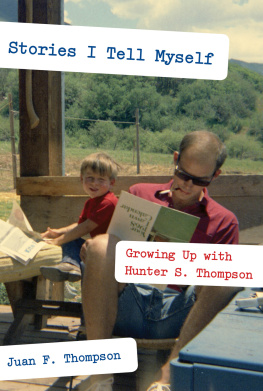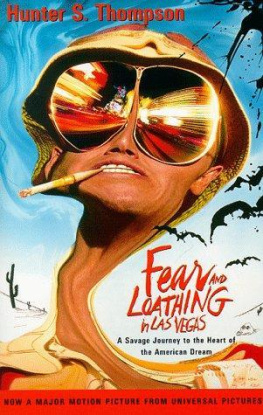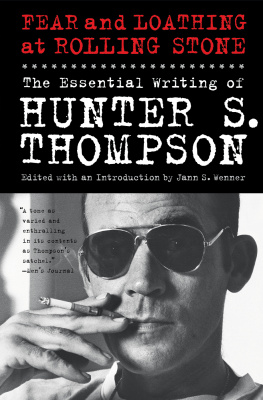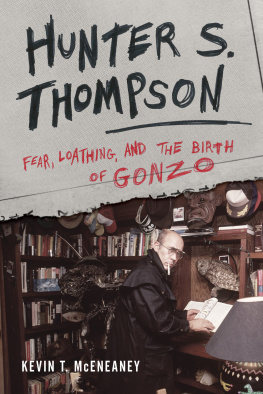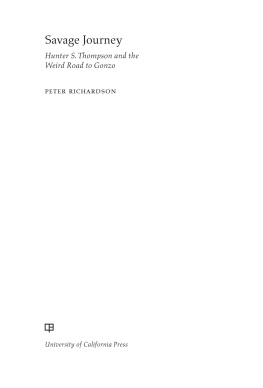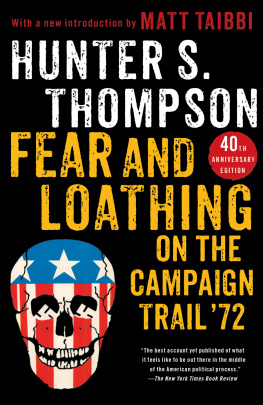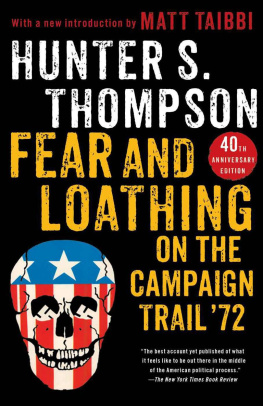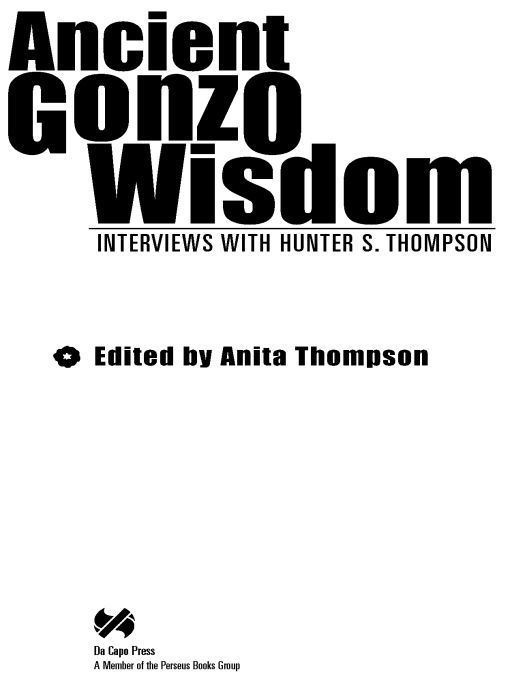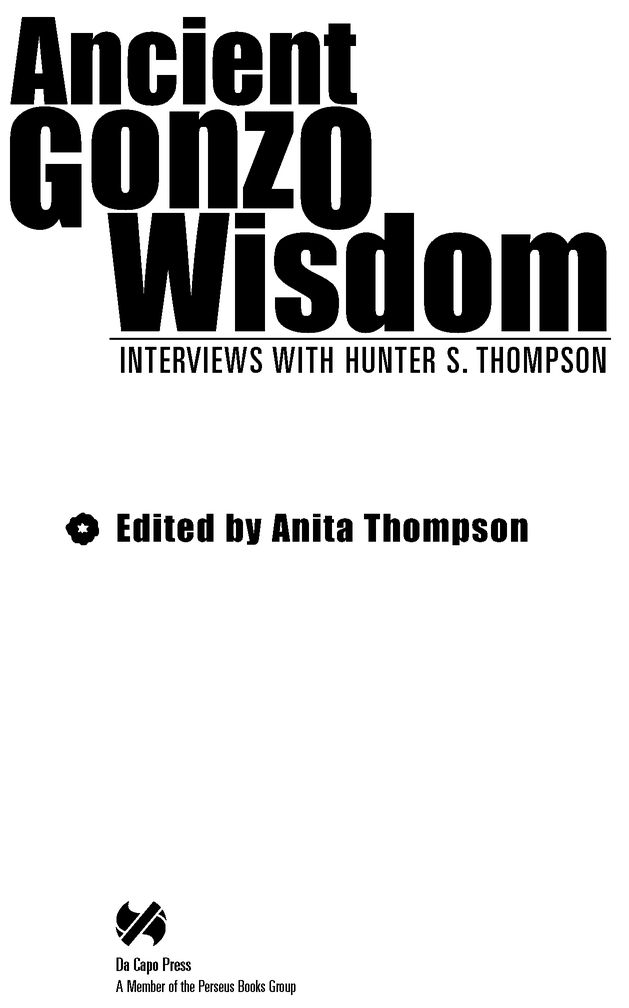Table of Contents
Also by Hunter S. Thompson
Hells Angels
Fear and Loathing in Las Vegas
Fear and Loathing: On the Campaign Trail 72
The Great Shark Hunt
The Curse of Lono
Generation Swine
Songs of the Doomed
Screwjack and Other Stories
Better Than Sex
The Proud Highway
The Rum Diary
Fear and Loathing in America
Kingdom of Fear
Hey Rube
Fire in the Nuts
The Mutineer
Also by Anita Thompson
The Gonzo Way
Ralph Steadman
George Stranahan
Doug Brinkley
Earth, receive an honoured guest;
William Yeats is laid to rest:
Let the Irish vessel lie
Emptied of its poetry.
Time, that is intolerant
of the brave and innocent,
And indifferent in a week,
To a beautiful physique,
Worships language and forgives
Everyone by whom it lives;
Pardons cowardice, conceit,
Lays its honours at their feet.
Time that with this strange excuse
Pardoned Kipling and his views,
And will pardon Paul Claudel,
Pardons him for writing well.
W. H. AUDEN
Acknowledgments
This book is a compilation of Hunters interviews made over the course of nearly forty years, and the manuscript took shape over the course of two years, so there are many people to thank.
Doug Brinkley, Hunters literary executor, started the ball rolling when he urged me to provide this book to students and scholars of Hunter.
Brandon Wenerd, my godsend research and production assistant, began with multiple emails asking me how he could become an Owl Farm intern. After several months of persistence, he turned into the perfect match for this book and has stuck with me every step of the way and has proved to be professional in the true sense of Gonzo.
Jeff Posternack and Vaughn Shinall were helpful in getting the manuscript to an excellent publisher, and thanks to Gonzo Trustees George Tobia and Hal Haddon for their work in estate matters. Id also like to thank Christopher Hitchens for his spicy introduction.
My editor, Ben Schafer at Da Capo Press, gently nudged me along and was very encouraging during the sometimes painful decision-making process: Which of Hunters words to include and which to leave out? He was understanding of my personal attachment to Hunters every syllable. So, thanks to his patience, I was able to edit hundreds of pages knowing I had Da Capos support.
Jon Kenneth Williams, one of my teachers at Columbia University, helped me with the initial task of editing down the first 1,000+ pages, along with his humor and moral support. David Frank, Andrew Travers, and Jonathan Bastian were very helpful in giving me their valuable insight.
Alex Gibney, Don Fleming, Eric Shoaf, and Jigsaw Productions along with Sarah Funke of Horowitz Gallery were gracious to dust off, digitize and archive valuable files that had never been seen in print, until now.
Renee Caputo and Norman MacAfee, who helped edit the final manuscript, then the final of the final, then the final final manuscript, and did a lovely job. Thank you, guys.
Perhaps the biggest thanks goes to those brave and lucky individuals who interviewed Hunter over the forty years of his historic and spectacular life as a writer, and for asking those questions that had never been asked, or asking them again thirty years later, to find Hunter had the same wisdom to offer. You bought the ticket, and took the ride. Thanks for your contributions to this book.
Preface: A Whisper to the Reader
Given under my hand this twelfth day of February, 2009, in Butler Library at Columbia University, three miles back from Annabel Lees kingdom by the seathe same certainly affording the most charming view to be found on this planet, and with it the most dreamlike and enchanting sunsets to be found on any planet or even in any solar systemand given, too, with the busts of Cervantes and Sophocles and other grandees of this line looking approvingly down upon me as they used to look down upon Hunter and Barack Obama....
Okay, Ill stop with the Mark Twain impersonation and get to the matter at hand, or, rather, in your hands. I am just the messenger or, as it were, the editor: Being the gal who spent his latter years with Hunter and who has read the letters and emails from so many of you who, especially after the volumes and films about him overwhelmed the bookshelves and movie screens since his death, wish you were given the chance to sit down with Hunter and simply talk and ask him some questions, without the external chatter.
Peter Olszewski, for instance, asked about the lectures that Hunter gave to young people, some of which I included in this volume, to which Hunter replied, We could probably clear this up because this is a fairly major point. In truth I dont even give lectures. All I do is appear and take a lot of abuse, and sort of maintain a dialogue.... I like to get them up, get them moving, get them angry, but after that I just like to talk to people. Olszewski then asked, Is there any particular thing you like talking about?
Whatever people want, Hunter replied. I have nothing to say. I have no message. Ill talk with anyone who wants to talk.
This, dear reader, is the closest thing to that talk. His voice rings clear through the style of the interviews selected and from the transcribed tapes thereof, many of which have never seen print until now, though they comprise a goldmine of personal thoughts and laughs with the man we all love and love to study and who is and always will be missed by all who knew him. The beauty of the matter is that like those greats who look down upon me now in Butler Library, Hunter will live forever in his work, long after you and I are gone.
In these pages, you will see that just as Vladimir Nabokovs mind mirrored his homelandRussia, with its vast memories of good and evil, its rich and profound literature, and its language tightly laced with double and triple meaningsHunter S. Thompsons mind mirrored that of America: revolutionary, passionate, and intensely complex. Along with learning new aspects of his life and work in these interviews, some of which I had not even heard of before his death, I have been comforted to see in these interviews the same Hunter I know from our private life at Owl Farm. So I will now step back, and let you sit down and enjoy the conversation.
Your friend in Woody Creek,
Anita Thompson
(Writing from Hunters alma mater,
Columbia University, New York City,
February 12, 2009)
Introduction
In the spring of 1990 I flew to Aspen, Colorado, to cover a summit meeting between Prime Minister Margaret Thatcher and President George Herbert Walker Bush. This fairly routine political event took on sudden significance when, on the evening before the talks were scheduled to begin, Saddam Hussein announced that the independent state of Kuwait had, by virtue of a massive deployment of military force, become a part of Iraq. We were not to know that this actand the name Saddam Husseinwould dominate international politics for the next decade and more, but it was still possible to witness something extraordinary: the sight of Mrs. Thatcher publicly inserting quantities of lead into George Bushs pencil. The spattering quill of a Ralph Steadman would be necessary to do justice to such a macabre yet impressive scene.


